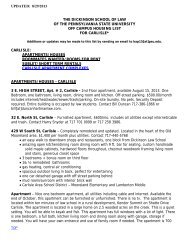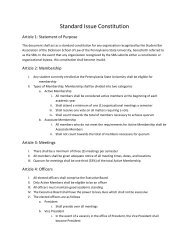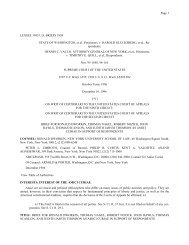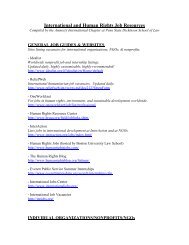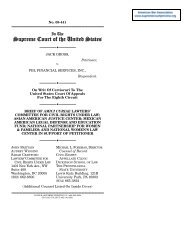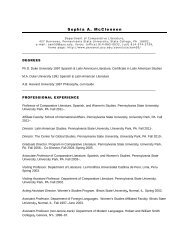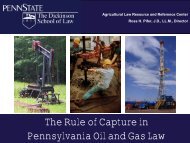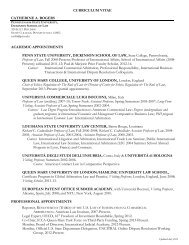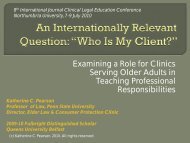Homeland Security - Penn State Law
Homeland Security - Penn State Law
Homeland Security - Penn State Law
You also want an ePaper? Increase the reach of your titles
YUMPU automatically turns print PDFs into web optimized ePapers that Google loves.
UNCLASSIFIED II FOR OFFICIAL USE ONLY<br />
determination of what evidence is credible and the weight given to that evidence shall be within<br />
the sole discretion of DHS personnel.<br />
The determination of whether or not the noncompliance was willful will be based on the totality<br />
of the circumstances, involving a careful consideration of all factors, including but not limited to<br />
evidence in the record, statements by the individual, or other relevant information. As always,<br />
DHS personnel possess the authority to elicit and consider evidence to aid in determining<br />
whether an alien was subject to and complied with NSEERS requirements and whether any<br />
noncompliance was willful. In keeping with DHS's obligation to consider whether an alien has<br />
complied with all U.S. immigration laws when evaluating an alien's eligibility for immigration<br />
benefits, application for admission, removability, or other related matters, DHS personnel should<br />
thoroughly review the record before them and request additional information, as necessary and<br />
appropriate, to ensure a fair and proper evaluation ofNSEERS noncompliance.<br />
In making these determinations, DHS personnel should consider anew all available<br />
information, notwithstanding any finding of willfulness that predates this memorandum<br />
and the guidance set forth herein.<br />
It is important to note that a TECS lookout for an NSEERS violation, alone, does not constitute<br />
conclusive evidence of willful noncompliance. In contrast, an admission by an alien that his/her<br />
act of violating NSEERS was willful is conclusive evidence of willful noncompliance.<br />
Evidence that would support a finding that the noncompliance was not willful includes, but is not<br />
limited to:<br />
• Credible claims that the alien received inaccurate or incomplete advice by INS or DHS<br />
personnel about where to report or register;<br />
• Credible claims that the alien was in contact with INS or DHS, but INS or DHS failed to<br />
accurately advise the alien as required under the regulations;<br />
• Incapacitation of the alien (e.g., serious illness and/or hospitalization, admission into a<br />
nursing home or extended care facility where mobility is severely limited) that prevented<br />
him or her from complying;<br />
• Exceptional circumstances beyond the control ofthe alien (e.g., natural disaster, death of<br />
the spouse, child, or parent of the alien) that prevented him or her from complying; or<br />
• Any other evidence showing that the failure to appear was through no fault of the alien.<br />
Failure to comply with an NSEERS requirement based on personal inconvenience or fear of<br />
immigration consequences will not support a finding that the violation was not willful.<br />
Referral of Cases<br />
Effective immediately, USCIS will cease referring suspected NSEERS violations to ICE for<br />
assistance in determining eligibility for immigration benefits administered by USCIS.<br />
Furthermore, all cases that were previously forwarded to ICE for such purposes, but in which<br />
ICE has not issued a Notice to Appear, will be returned to USCIS for appropriate handling,<br />
consistent with this guidance. In such cases, USCIS shall assume responsibility for making the<br />
final determination as to whether an alien's past failure to comply with an NSEERS requirement<br />
5<br />
UNCLASSIFIED II FOR OFFICIAL USE ONLY




